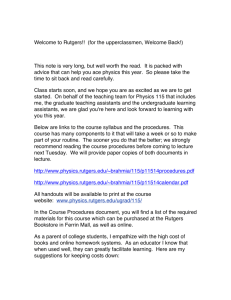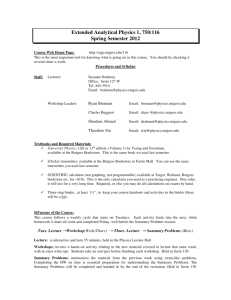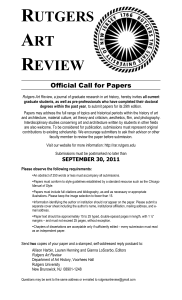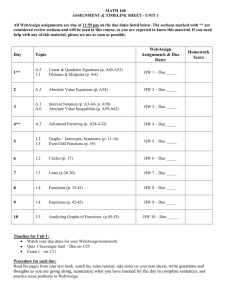Extended Analytical Physics 1, 750:115 Fall Semester 2015
advertisement
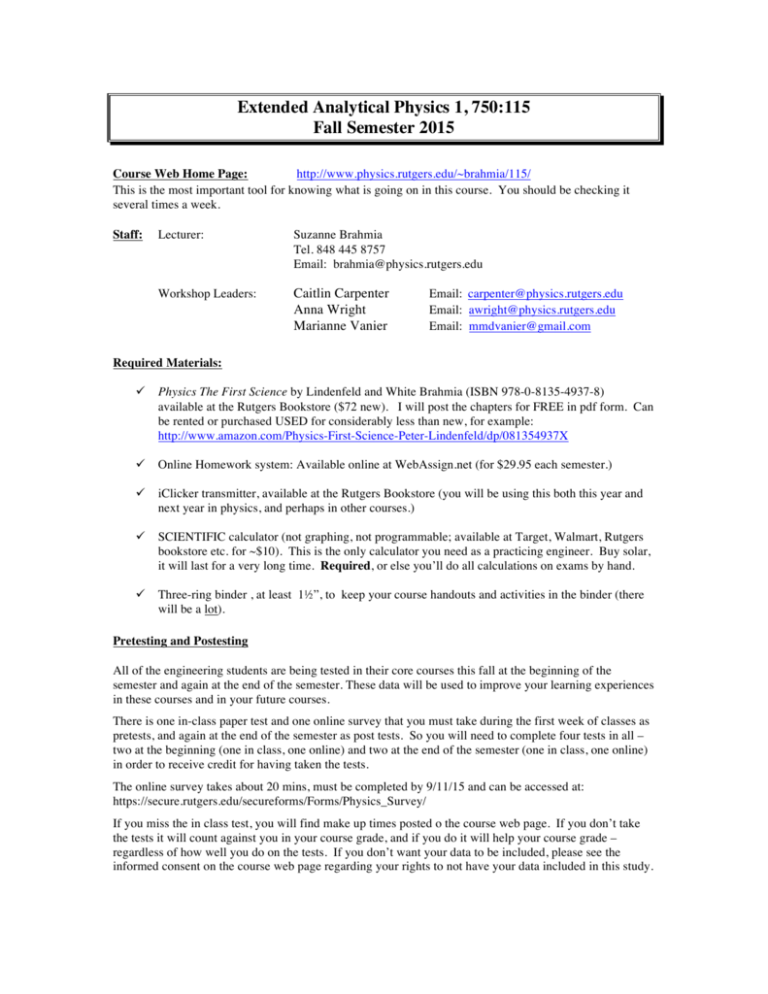
Extended Analytical Physics 1, 750:115 Fall Semester 2015 Course Web Home Page: http://www.physics.rutgers.edu/~brahmia/115/ This is the most important tool for knowing what is going on in this course. You should be checking it several times a week. Staff: Lecturer: Suzanne Brahmia Tel. 848 445 8757 Email: brahmia@physics.rutgers.edu Workshop Leaders: Caitlin Carpenter Anna Wright Marianne Vanier Email: carpenter@physics.rutgers.edu Email: awright@physics.rutgers.edu Email: mmdvanier@gmail.com Required Materials: ! Physics The First Science by Lindenfeld and White Brahmia (ISBN 978-0-8135-4937-8) available at the Rutgers Bookstore ($72 new). I will post the chapters for FREE in pdf form. Can be rented or purchased USED for considerably less than new, for example: http://www.amazon.com/Physics-First-Science-Peter-Lindenfeld/dp/081354937X ! Online Homework system: Available online at WebAssign.net (for $29.95 each semester.) ! iClicker transmitter, available at the Rutgers Bookstore (you will be using this both this year and next year in physics, and perhaps in other courses.) ! SCIENTIFIC calculator (not graphing, not programmable; available at Target, Walmart, Rutgers bookstore etc. for ~$10). This is the only calculator you need as a practicing engineer. Buy solar, it will last for a very long time. Required, or else you’ll do all calculations on exams by hand. ! Three-ring binder , at least 1½”, to keep your course handouts and activities in the binder (there will be a lot). Pretesting and Postesting All of the engineering students are being tested in their core courses this fall at the beginning of the semester and again at the end of the semester. These data will be used to improve your learning experiences in these courses and in your future courses. There is one in-class paper test and one online survey that you must take during the first week of classes as pretests, and again at the end of the semester as post tests. So you will need to complete four tests in all – two at the beginning (one in class, one online) and two at the end of the semester (one in class, one online) in order to receive credit for having taken the tests. The online survey takes about 20 mins, must be completed by 9/11/15 and can be accessed at: https://secure.rutgers.edu/secureforms/Forms/Physics_Survey/ If you miss the in class test, you will find make up times posted o the course web page. If you don’t take the tests it will count against you in your course grade, and if you do it will help your course grade – regardless of how well you do on the tests. If you don’t want your data to be included, please see the informed consent on the course web page regarding your rights to not have your data included in this study. Structure of the Course: This course follows a weekly cycle that starts on Tuesdays. • Each activity feeds into the next. • There is a WebAssign Reading Quiz on Tuesdays before the first lecture of the cycle. • You’ll work on the WebAssign Homework all week and submit it by Friday, well before the Summary Problem session on Monday • Office hours and study groups are available outside of class, in addition to RLC tutoring, to help you with the WebAssign activities. Reading → (Quiz on WebAssign to be completed by 12 noon on Tuesdays) Tuesday → Lecture . Physics Lecture Hall . . Workshop → (Weds/Thurs) . . Serin 130. . . Thursday → Lecture . Physics Lecture Hall . . WebAssign → Homework due (Friday) Reading Assignments and Guided Review The reading assignments are all in your textbook, with two supplemental assignments. Much of the reading is in the form of Example Problems that you should actively work through. At the end of the chapter you’ll find the Guided Review problems that couple directly to the Examples in the chapter; completing them allows you to better understand the examples. Your reading quizzes will be completed online at WebAssign by TUESDAY at NOON and the questions will be selected from the Guided Review questions. The lowest 3 reading quiz grades will be dropped at the end of the semester to allow for the occasional mishap in time management or life in general. Reading Completed by Reading pages Guided Review 9/3/14 1-8 Ch 1: 1,2 9/8/14 16-25; 33-40 Ch 2: 1,2,3,4,5,6,7,8,9,10 Ch3: 1,2,3,4,5 9/15/14 40-46 Ch 3: 6,7,8,9,10,11 9/22/14 46-49; 63-67 Ch 3. 12,13 Ch 4: 5,6,7,8 10/6/14 57-68 Ch 4:1,2,3,4,5 10/13/14 68-71;75-76 Ch 4: 9,10,11,12, 10/20/14 26-28; 70-71;75-76 Ch 4: 13,14,15,16,17 10/27/14 77-78, proj motion Ch 4: 23, 24 supplement 11/3/14 90-101 Ch 5: 1,2,3,4,5,6,7 11/17/14 71-74 Ch 4: 18 11/24/14 103-116 Ch 6: 1,2,3,4,5,6,7,8,9 12/1/14 117-125 Ch 6: 10,11,12,13,14,15,16,17,18,19, 20,21,22,23 Lecture Coming prepared to lecture is required for this course. Preparation means completing the required reading before Tuesday lectures. The lectures are interactive. You are required to purchase an iClicker in order to participate in lecture; a portion of your course grade is determined by your participation in lecture. Workshop Meeting Times: (Serin W130) Section Section Meeting times Instructor R1 M Th 10:20-11:40 AM Marianne Vanier R2 M Th 12:00-1:20 PM Marianne Vanier R3 M W 1:40-3:00 PM Caitlin Carpenter R4 M W 3:20-4:40 PM Caitlin Carpenter R5 M W5:00-6:20 PM Anna Wright R6 M W 6:40-8:00 PM Anna Wright Learning Assistant Charlton Thompson Trent Handlovsky Ian Singer Emily Lopez Chioma Ekedede Meera Dhawan Summary Problems (Monday) Serin 130 Workshop: The Workshop Activity takes place during the recitation that meets either on Wednesday or Thursday (depending on your schedule.) There you will work collaboratively and will have an oral quiz at the end of the recitation meeting. In the case of emergency you can make up a missed Workshop the same week during a different recitation, but you must get permission from Suzanne Brahmia BEFORE you can attend a different recitation time. A Workshop cannot be made up after 3rd period on Thursday of the week in which it is assigned, but the lowest score will be dropped when calculating your final grade. In general, at least 30% of the exam questions are based on the Workshop activities. Homework and Office Hours Physics is a problem-based discipline, you must do the homework in order to learn the material. The textbook homework assignments should be started during the week in which the material is discussed in lecture. This homework will be submitted online at: http://webassign.net/ The course staff will hold office hours during the week in ARC 332. Please come and get any questions you have answered; this time is your time. Instructor’s office hours are posted on the course website. We will not be using recitation time to go over homework, it is your responsibility to seek help on the homework during office hours, study groups of campus tutoring. You are welcome to attend the office hours of ANY instructor to get help. The homework is due electronically; the deadline is Friday at 11:59 PM (but can be submitted anytime before then). NO HOMEWORK WILL BE ACCEPTED LATE. Summary Problem Session: The Summary Problem session takes place during the Monday recitation. In this session you will be working on problems that summarize the previous week’s work. You can make up missed Summary Problems on the same Monday (only) during any other regularly scheduled recitation meeting, but you must get permission from Suzanne Brahmia BEFORE you can attend a different recitation time. These problems cannot be made up after Monday but the lowest score will be dropped when calculating your final grade. In general, at least 30% of the exam questions are based on the Summary problem activities. Study Groups: You can register for an additional 1-credit study group that meets weekly and is led by one of the Lead Learning Assistants from this course. Look for an announcement in your email and in lecture about this. The available times are: LEARNING ASSISTANT Chioma Ekedede Trent Handlovsky Emily Lopez STUDY GROUP T 12:00 PM - 1:20 pm T 3:20-4:40 pm Th 8:10-9:30 pm LOCATION SERC 106 ARC 328 SERC 106 The Math and Science Learning Center Tutoring: The MSLC is an innovative facility to assist students studying physics and related subjects. There you can find RLC tutoring for a variety of math and science courses, including this one. You can come find your colleagues and get answered any questions you may have. Please visit: http://mslc.rutgers.edu Rutgers Learning Centers: The Rutgers Learning Centers (RLC) can provide you with assistance with academic coaching, test anxiety, test-taking strategies, or one-on-one tutoring in many subjects. http://rlc.rutgers.edu Students with Disabilities: If you have a disability, you are urged to speak to the course supervisor early in the semester to make the necessary arrangements to support a successful learning experience. Also, you must arrange for the course supervisor to receive a letter from your College's Disabilities Concerns Coordinator verifying that you have a disability. A list of the College Coordinators can be found at: http://www.physics.rutgers.edu/ugrad/disabilities.html Grading: Policy on Cheating: You are encouraged to work with others in this course but the work you turn in must be YOUR work in YOUR words. If the work on your paper is the same as that of anyone else in the class, your College Dean will be notified and you will receive a “0” for the assignment. This means that if someone copies your work or you copy someone’s work, both papers will receive zeros. A zero on an exam will result in you failing this course, and possible expulsion from the University. Your course grades are determined by the following: Hourly Exams (2): There will be two common hourly exams that will be held in class from 1:40 – 3:00 PM. The maximum score on each exam is 100 points. EXAM POLICY: Bring a pencil and a scientific calculator. You will not be permitted to bring anything else to the exams. The exam formula sheet is available on the course web page and will be provided to you at the exam. Hourly Exam/Oral Presentation Grading Scale: 83-100 77-82 71-76 65-70 60-64 54-59 0-53 Design Practicals and Presentation (1): There are three experimental design practicals during the semester that your group will prepare together in class. At the end of the semester you and your group will prepare a 5 minute oral presentation on one of the design practicals. The design practicals and presentation are graded out of a total of 50 points. Final (1): Maximum score is 200 points, double that of a single hourly exam. The exam policy stated above is also followed for the final exam Recitation Grade (Maximum score 330 points): Homework 50 points Summary Probs 150 points Workshops 80 points Reading Quizzes 25 points Pre/Post Completion 15 points Participation 10 points Participation Score: At the end of the semester your TA will award you a participation grade based on your activity and engagement in recitation and participation on iclicker questions in lecture. This grade also depends on how well you function within your group as a team member. Course Grade: (Maximum 780 points) Course Grading Scale: 647-780 600-646 554-599 508-553 468-507 421-467 0-420 A B+ B C+ C D F A B+ B C+ C D F
